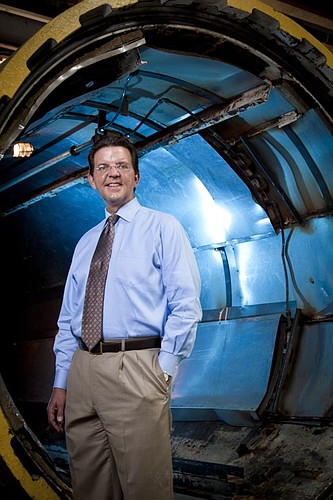- November 24, 2024
-
-
Loading

Loading

There aren't too many internal business disputes that stump Daniel Judge III, who represents the third generation of his family to run a Manatee County aerospace manufacturing business.
It's somewhat genetic, considering Judge's grandfather was an accomplished Sarasota attorney whose clients included the heirs of circus maven John Ringling. The third-generation Judge now runs Honeycomb Company of America, a firm with more than $5 million in annual sales that makes spare airplane parts for the U.S. military.
But when Judge walked into the men's room at Honeycomb one day last year, he encountered a dispute he had never seen before: Gang graffiti spray-painted on the stall doors.
This wasn't some random act. Instead, besides communication between gang members, the graffiti represented one of the more unique employment programs on the Gulf Coast: Over the past three years, Judge has hired at least 12 people for his 100-employee company who live a life of gangs, crime, or many times, both.
The hirings are part of a larger anti-gang program run by the Manatee County YMCA in conjunction with the Manatee County Sherriff's Office at Pride Park, a few miles from the Honeycomb facility. The park is known to law enforcement as a major gang hangout and meeting spot.
Pastor Jerry Parrish, who runs youth and anti-gang programs for the YMCA, says the local gang problem is more acute than people realize. “If we don't shake these people up and give them some direction,” says Parrish, “we will have some serious problems down the line.”
Adds Judge: “This isn't just people at risk or children on the edge. It's the real deal.”
Judge actually preferred to keep his program a secret, both to protect the workers and the gang members. Few, if any local politicians even knew about the program until March, when Honeycomb won the Governor's Community Investment Award from the state and the Florida Juvenile Justice Foundation.
The award broke the secret. And now that it's out, Judge spoke with other executives and community leaders in the state about how the program works within Honeycomb. In fact, Judge and Parrish recently met with some executives and officials in Lee County to tout the program.
“We didn't want to change the world,” says Judge. “We just wanted to provide some jobs to the people at Pride Park.”
Still, not everyone at Honeycomb shared Judge's vision back in 2007, when the idea first came up.
Judge wanted to cover himself and his company, legally and safety-wise, before he hired his first gang member. He checked with his internal human resources department and he consulted with an outside firm.
The verdict: Don't do it.
Indeed, Honeycomb's human resources director handed Judge a three-page white paper that detailed all the reasons it was a bad idea that could jeopardize the future of the company.
“I would love to say that everyone in senior management embraced and loved this idea,” says Judge. “But life doesn't work that way.”
Judge nonetheless decided the risks were worth the potential rewards. And he proceeded cautiously: Every employee in the program is vetted by the Sherriff's office.
Judge emphasizes this isn't a government subsidy program, whereby Honeycomb earns tax breaks or other perks for hiring gang members. He also emphasizes the jobs aren't handouts: The applicants compete against others who seek the same jobs, most of which are in maintenance or painting.
Judge found the program mostly by accident. In 2002, when he met Sean Allison, Manatee YMCA president and chief executive, at a C12 meeting of local Christian business executives. A few years later the two friends began to discuss how Honeycomb could help with the community's anti-gang efforts.
“It has to start with jobs,” says Judge. “Otherwise they become social welfare recipients, which is never good.”
—Mark Gordon